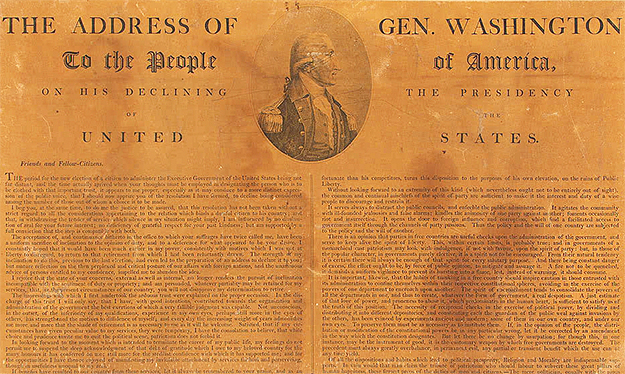Welcome to this week’s Bill Harvey Blog.
Updated July 3, 2025. Original post: July 2, 2021
HAPPY AMERICAN INDEPENDENCE DAY 2025!

Washington’s Farewell Address
For at least two decades from July 4, 1776, George Washington was the most trusted person in the United States of America.
The Walter Cronkite of his times.
He served as President when, to him, the job was a burden rather than a prize.
He was the glue of authenticity and integrity that gave our country its chance to build a foundation that would last.
For two decades, he made parties unnecessary, because all differences could be resolved in him.
And then, when the party divisions arose with their bitterness and hate, he stood down and would not accept another term as President. He was 64. Average life expectancy for an American male was 36.
In departing, he was sure to warn us about the forces that were arising to counter the most innovative governmental structure in history.
In this post, I will read you some excerpts from George Washington’s final address, his last guidance to the children of the country he helped create and lead through its fragile infancy. I’ll also provide the link to the full going away letter he left for all of us, which is read annually to both houses of Congress.
I hope it revitalizes your true loyalty to our true bedrock principles, and helps bring the unity we need now more than we have ever needed it before.
Washington begins by humbly and diffidently explaining why he will not accept another term in office:
Transcript Excerpts of President George Washington’s Farewell Address (1796)
Friends and Fellow Citizens:
The period for a new election of a citizen to administer the executive government of the United States being not far distant, and the time actually arrived when your thoughts must be employed in designating the person who is to be clothed with that important trust, it appears to me proper that I should now apprise you of the resolution I have formed, to decline being considered among the number of those out of whom a choice is to be made.
Later in his address, he warns of the dangers of the political parties just then sprouting up in America:
I have already intimated to you the danger of parties in the State, with particular reference to the founding of them on geographical discriminations. Let me now take a more comprehensive view, and warn you in the most solemn manner against the baneful effects of the spirit of party generally.
This spirit, unfortunately, is inseparable from our nature, having its root in the strongest passions of the human mind. It exists under different shapes in all governments, more or less stifled, controlled, or repressed; but, in those of the popular form, it is seen in its greatest rankness, and is truly their worst enemy.
The alternate domination of one faction over another, sharpened by the spirit of revenge, natural to party dissension, which in different ages and countries has perpetrated the most horrid enormities, is itself a frightful despotism. But this leads at length to a more formal and permanent despotism. The disorders and miseries which result gradually incline the minds of men to seek security and repose in the absolute power of an individual; and sooner or later the chief of some prevailing faction, more able or more fortunate than his competitors, turns this disposition to the purposes of his own elevation, on the ruins of public liberty.
Without looking forward to an extremity of this kind (which nevertheless ought not to be entirely out of sight), the common and continual mischiefs of the spirit of party are sufficient to make it the interest and duty of a wise people to discourage and restrain it.
It serves always to distract the public councils and enfeeble the public administration. It agitates the community with ill-founded jealousies and false alarms, kindles the animosity of one part against another, foments occasionally riot and insurrection. It opens the door to foreign influence and corruption, which finds a facilitated access to the government itself through the channels of party passions. Thus the policy and the will of one country are subjected to the policy and will of another.
There is an opinion that parties in free countries are useful checks upon the administration of the government and serve to keep alive the spirit of liberty. This within certain limits is probably true; and in governments of a monarchical cast, patriotism may look with indulgence, if not with favor, upon the spirit of party. But in those of the popular character, in governments purely elective, it is a spirit not to be encouraged. From their natural tendency, it is certain there will always be enough of that spirit for every salutary purpose. And there being constant danger of excess, the effort ought to be by force of public opinion, to mitigate and assuage it. A fire not to be quenched, it demands a uniform vigilance to prevent its bursting into a flame, lest, instead of warming, it should consume.
He goes on to warn against the danger of one branch of government becoming dominant:
It is important, likewise, that the habits of thinking in a free country should inspire caution in those entrusted with its administration, to confine themselves within their respective constitutional spheres, avoiding in the exercise of the powers of one department to encroach upon another. The spirit of encroachment tends to consolidate the powers of all the departments in one, and thus to create, whatever the form of government, a real despotism. A just estimate of that love of power, and proneness to abuse it, which predominates in the human heart, is sufficient to satisfy us of the truth of this position. The necessity of reciprocal checks in the exercise of political power, by dividing and distributing it into different depositaries, and constituting each the guardian of the public weal against invasions by the others, has been evinced by experiments ancient and modern; some of them in our country and under our own eyes. To preserve them must be as necessary as to institute them. If, in the opinion of the people, the distribution or modification of the constitutional powers be in any particular wrong, let it be corrected by an amendment in the way which the Constitution designates. But let there be no change by usurpation; for though this, in one instance, may be the instrument of good, it is the customary weapon by which free governments are destroyed.
To me, the humility, authenticity, and kindness of the Father of our Nation comes through loud and clear in these his last words of advice, to us his children, endowed to carry on the idealism of the Founders.
Let his spirit re-inspire us to our original Mission and Values, and help us return to unity with forgiveness and a renewed dedication to work together for the good of all of us.
What you feel when you read these words of George Washington…
You are feeling what it is to Be An American.
This American Noble Experiment is worth preserving!
Commemorating and honoring that Beacon for The World,
A song from the heart of Ray Charles in 2022, 50 years after first singing this rendition of it on the Dick Cavett Show.
I hope you agree with me that this post should be sent to as many Americans as possible. If we each send it to 10 or more people asking them to send it to ten or more people, by the sixth round at least a million people will have received it.
My best wishes to all,
![]()
Image source: George Washington, Public domain, via Wikimedia Commons
This image is available from the United States Library of Congress’s Religion and the Founding of the American Republic exhibition.

